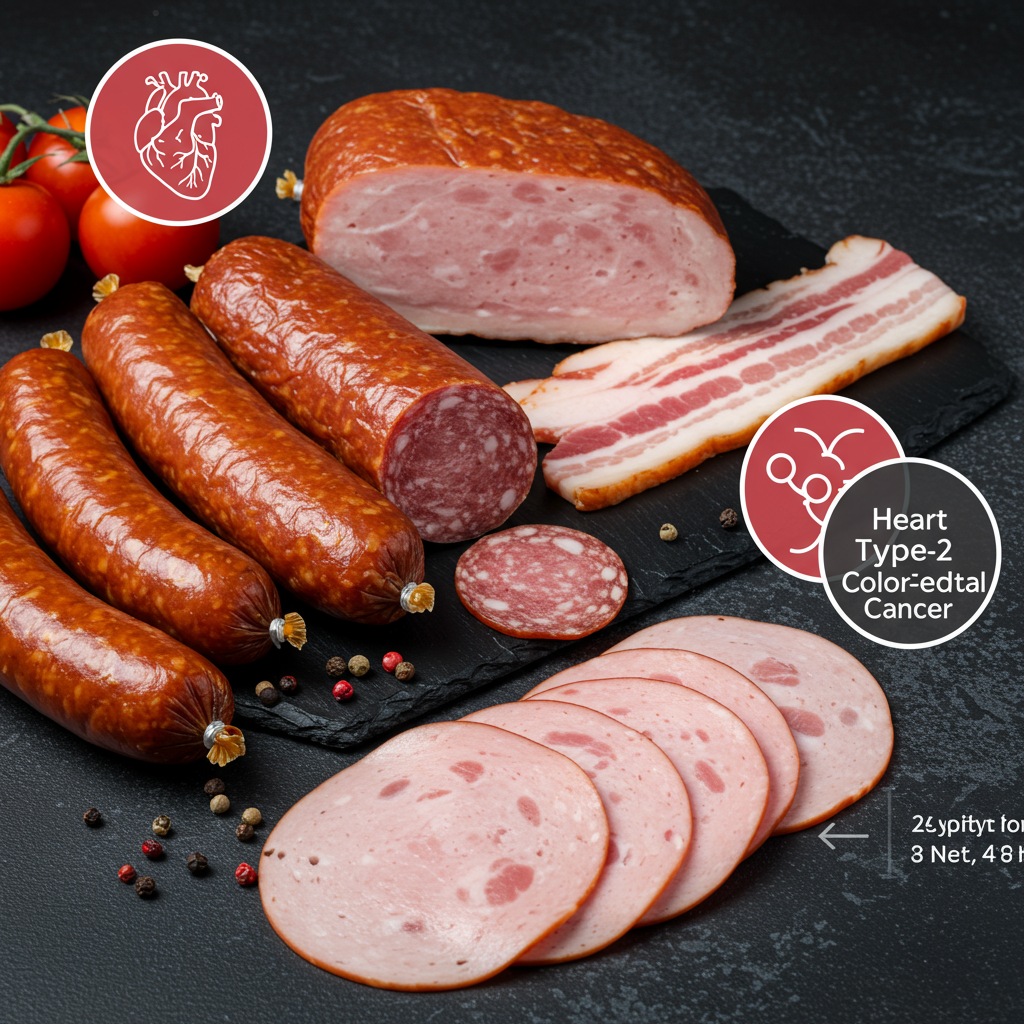A massive study involving over half a million people spanning decades has issued a stark warning: consistently eating large amounts of ultra-processed foods (UPFs) significantly increases your risk of dying sooner, particularly from heart disease and diabetes. This groundbreaking research, one of the largest and longest of its kind, adds substantial weight to concerns that the convenience foods staples of modern diets may harbor hidden dangers impacting longevity. The findings suggest something inherently risky in heavily engineered food products, with specific culprits like processed meats and sugary drinks highlighted as major drivers of this increased risk.
Decades-Long Study Links UPFs to Shorter Lifespans
The study, conducted by researchers at the National Cancer Institute (NCI) and analyzing data from the NIH-AARP Diet and Health Study, followed more than 540,000 U.S. adults for up to 23 years (median follow-up). Participants were aged 50 to 71 when they first reported their dietary habits in the mid-1990s. Over the study period, a significant portion of the cohort passed away, allowing scientists to compare mortality rates based on ultra-processed food consumption levels.
Individuals who reported eating the most ultra-processed foods faced approximately a 10% higher risk of dying during the study period compared to those who consumed the least. This isn’t just a minor blip; it’s a noticeable increase in overall mortality risk observed across hundreds of thousands of lives.
Unpacking the Specific Health Threats
The research drilled down into the causes of death, revealing specific links that underscore the critical health implications of a UPF-heavy diet. A strong association was found between high ultra-processed food intake and increased deaths from both heart disease and diabetes. These two conditions are major public health burdens, and the study suggests UPFs play a significant role in worsening outcomes. Interestingly, the study did not find a clear statistical link between higher UPF consumption and cancer-related deaths, though other research has sometimes indicated such connections, particularly for processed red meat and specific cancer types.
Beyond the Obvious: Independent Risks of Processed Foods
One of the most compelling aspects of this study is how researchers accounted for other well-known risk factors. They controlled for elements like body weight (BMI), smoking habits, and even overall diet quality (measured by the Healthy Eating Index). Despite these adjustments, the link between high UPF intake and increased mortality persisted. This suggests that the elevated risk isn’t simply because people who eat more UPFs also tend to smoke more, be less active, or have poorer diets in general. Instead, there appears to be something unique about the ultra-processing itself or the resulting food matrix that contributes to health risks independently.
Dr. Erikka Loftfield, a Stadtman Investigator at the National Cancer Institute and a lead researcher on the study, commented on this. She noted that the findings align with existing scientific literature showing adverse health impacts from ultra-processed foods. However, she also emphasized the ongoing scientific question: “there is still a lot that we don’t know, including what aspects of ultra-processed foods pose potential health risks.”
Identifying the Primary Culprits
While ultra-processed foods are a broad category, the study was able to identify which specific types seemed most strongly tied to the increased death risk. Highly processed meats, such as hot dogs, sausages, and deli slices, and soft drinks, including both sugary and diet or sugar-free versions, stood out. Dr. Loftfield pointed out that limiting these particular food groups is already a standard recommendation in dietary guidelines for promoting health and preventing disease. Within the study population’s diet, soft drinks (including sugar-free options) were the largest contributors to participants’ overall ultra-processed food intake, followed closely by sugary soft drinks and then processed meats.
Quantifying the Impact: Minutes Lost Per Serving?
Further insights from reports citing similar research presented at Nutrition 2024 offer a startling perspective on the potential impact of these specific foods. According to one nutritionist referencing study data, consuming certain ultra-processed items could be estimated to reduce life expectancy by a specific number of minutes per serving. While such calculations are illustrative and based on complex modeling, they drive home the potential harm. A single hot dog, for instance, was estimated to potentially cut 36 minutes off life expectancy. Soft drinks were linked to a loss of about 12 minutes per serving, while cheeseburgers might take away 9 minutes, and other processed red meats like bacon could reduce life by around six minutes per serving. These figures, though models, highlight the specific foods identified in the large NCI study as major concerns.
What Exactly Are Ultra-Processed Foods?
Defining ultra-processed foods is key to understanding this risk. Researchers often use systems like the NOVA classification. Generally, these foods are made mostly from industrial ingredients and contain additives like flavors, colors, emulsifiers, and thickeners. They are typically high in calories, salt, sugar, and unhealthy saturated or trans fats. Examples range from packaged snacks, sugary cereals, and frozen meals to processed meats, pastries, and sugary drinks. The study categorized foods based on detailed dietary questionnaires and expert consensus using this system.
The Unanswered Questions and Broader Context
Despite the clear link between high UPF intake and increased mortality shown in this study, the exact biological mechanisms are still debated. Scientists are trying to determine if the harm comes primarily from the high levels of unhealthy components (salt, sugar, fat) or from other factors related to the processing itself, such as the physical structure of the food (matrix), the presence of novel compounds formed during processing, or the impact of additives on the gut microbiome and metabolic health.
Beyond mortality, diets high in ultra-processed foods are already linked to a host of other chronic health problems. These include obesity, type 2 diabetes, heart disease, and certain cancers. For example, public health bodies like the NHS specifically warn that high consumption of processed red meat is associated with an increased risk of bowel cancer.
It’s also important to note study limitations. This research shows association, not direct cause and effect. While powerful due to its size and duration, observational studies can never definitively prove that UPFs cause early death, only that they are strongly linked. Additionally, the dietary data was collected in the mid-1990s. Dietary habits and the composition of processed foods have evolved since then, underscoring the need for ongoing research to keep pace with changes in the food supply.
Actionable Steps for Healthier Eating
The findings reinforce existing public health recommendations. While some foods classified as ultra-processed might arguably fit into a healthy diet (like whole-grain bread or baked beans), the overwhelming evidence points to limiting the most problematic items. Focusing on a diet rich in whole, unprocessed or minimally processed foods – like fruits, vegetables, lean proteins, whole grains, and legumes – remains the best strategy for long-term health and longevity. Specifically reducing intake of highly processed meats and sugary/diet soft drinks, as highlighted by this massive study, appears to be a critical step in mitigating the increased risk of premature death, particularly from heart disease and diabetes.
Frequently Asked Questions
What did the large study reveal about ultra-processed foods and life expectancy?
A massive study tracking over 540,000 adults for more than 20 years found that those who ate the most ultra-processed foods had about a 10% higher risk of dying during the study period compared to those who ate the least. This increased risk was particularly strong for deaths related to heart disease and diabetes.
Which specific ultra-processed foods were most strongly linked to death risk in the study?
The study identified highly processed meats (like hot dogs, sausages, and deli meats) and soft drinks (including both regular and diet/sugar-free versions) as the types of ultra-processed foods most strongly associated with increased mortality risk. Some reports citing similar findings have even estimated alarming potential reductions in life expectancy per serving of these specific items, such as 36 minutes per hot dog.
Does eating ultra-processed foods mean I will definitely die early?
No, consuming ultra-processed foods increases the risk of earlier death compared to those who eat very few. The study found about a 10% higher risk for the highest consumers, which is a significant population-level finding, but it doesn’t guarantee an individual outcome. The research also shows association, not direct causation, although it controlled for many other health factors, suggesting an independent link. Reducing your intake of these foods is a strategy to lower your personal risk.
The findings of this extensive study provide compelling evidence that a diet high in ultra-processed foods poses a significant threat to long-term health and longevity. By highlighting the increased risk of death, particularly from heart disease and diabetes, and pinpointing specific culprits like processed meats and soft drinks, the research reinforces the importance of dietary choices for public health. While the exact mechanisms of harm warrant further study, the clear association observed across a massive population serves as a powerful call to prioritize whole, minimally processed foods for a healthier and potentially longer life.




